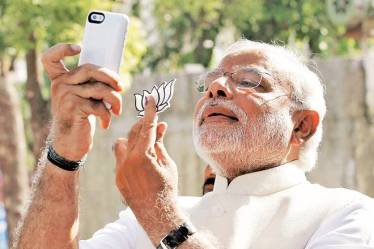Over the course of the next few days, the fate of over 4,000 candidates will be decided for 543 seats in the lower house of India’s parliament. Considered one of the largest democratic exercises, Indian elections are deemed to be a celebration of democracy, but the nature of electoral politics has changed over the last decade. As the world turned digital, Indian politics has also taken that turn.
Last election, only the incumbent Prime Minister and his party had recognised the importance of social media. Today, nearly every politician boasts of a Twitter, Facebook and Instagram account, so much so that the spectacle of democracy is now being played out on social media. Though Modi used social media very effectively in the last elections, in the true sense, this is the first time India is experimenting with platform democracy, wherein elections are being contested on the whims and fancies of social media. More importantly, the pervasiveness of mobile phones and cheap internet have allowed the population to witness and assess what their netas are or aren’t doing. digital, Twitter, Facebook, Instagram, narendra modi, India, digital india,
Come 2024, social media is going to play an even bigger role in deciding the fate of the nation. Many platforms—still in their nascent stage, at least in India—will be able to create personalised profiles for voters, helping political parties create better targeting mechanisms. Martin Moore’s work, Democracy Hacked: Political Turmoil and Information Warfare in the Digital Age, is a profound explanation of this phenomenon. In assessing the role of social media movements across the world, Moore has tried to explain why social media is gaining great popularity and why some actors are becoming more important than others in this global milieu.
Moore presents historical and anecdotal evidence on the rise of social media, detailing its use in the elections. As a director of Centre for the Study of Media, Communication and Power and senior research fellow at Policy Institute, King’s College, London, Moore’s focus is on the growing insurgence of certain entities on social media and their influence on democracy and public policy. He details this by dividing the book in three sections, highlighting the influence each of the constituents exerts in this process.
The first section discusses the role of participants in the process, that is, the individuals, the state and those who wield considerable power and position in the decision-making process. Here, Moore highlights the activities of ‘freextremists’ (anarchists who want nothing but chaos) followed by an explanation of the Mercer model, where some influential people try to exert control over the politics of social media. The last chapter of the section details the role of states like Russia, which, taking from the USSR model, have intensified their efforts in hacking and creating an alternative narrative.
The next section details the organisations, where Moore has focused on the three big social media platforms: Facebook, Google and Twitter. In case of the first two, the entire model relies on the advertising model of the two organisations. For Twitter, the focus is on the news business that it has so eloquently captured. The last part details the travails of democracies in the 21st century, where the author points to the idea of platform democracy along with issues of surveillance. He then presents examples of two states, Taiwan and Estonia, as model states for the future.
In the mid-1990s, Hardt and Negri wrote a book expounding a new kind of capitalism and presenting a theory of empire. The authors expressed that, given globalisation and a new wave of multicultural interactions, there may come a time when enterprises would become more powerful than governments, and would be able to dictate their will across the world. Millennials in this case would rise against this new form of autocracy, using the same tools that these capitalists used. Neither Hardt nor Negri had any idea that the future was not far away. In fact, when they wrote these words, America and the world were yet to see the rise of these new-age corporations. Google was yet to take the world by storm, people had not imagined connecting with billions across the world and no one had imagined that they would get their news in 140 characters in seconds rather than minutes. The world indeed has changed and so has politics. Although the new system comes with its own travails, the idea of democracy and liberalism is not entirely lost. Moore, while decrying the role of social media, does illustrate its power to sway opinion and guide new movements, but there are fallacies that need to be addressed too. He believes that even these conglomerates do not know how their resources or platforms will be used, which I find difficult to believe. While the author has provided enough evidence in support of his arguments, the anecdotal evidence does get taxing. More so, one needs patience and time to understand and deliberate on all aspects of the argument.
This is not a simple book and I would certainly not suggest it for readers who would be delving into this issue for the first time. It can be one of the first works—to my knowledge—where someone has tried to link the growing menace and influence of social media with the idea of democracy. This analysis becomes much more important at a time when the old ideals of liberalism have come under attack. There was, however, a need for more detailing in the book.
The writer is a former journalist
